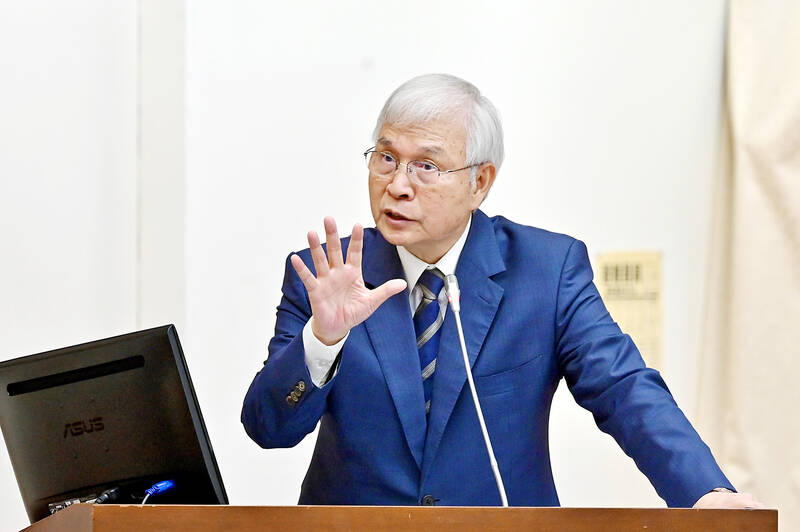The latest loan restrictions are aimed at slowing house prices and transactions, and more time is needed to see if the credit controls can achieve their intended effect, central bank Governor Yang Chin-long (楊金龍) told the legislature’s Finance Committee yesterday.
Yang explained his policy decisions while taking questions from lawmakers on the latest wave of credit controls the central bank introduced on Sept. 18.
“The housing market was overheating and mortgages growing rapidly,” Yang said, adding that real-estate lending constituted 37.5 percent of overall loans, very close to the historic high of 37.9 percent in October 2009.

Photo: George Tsorng, Taipei Times
The concentration of bank lending for properties is more serious than in 2009, he said.
A day earlier, state-run Mega International Commercial Bank (兆豐銀行), First Commercial Bank (第一銀行), Hua Nan Commercial Bank (華南銀行), Chang Hwa Commercial Bank (彰化銀行) and Taiwan Cooperative Bank (合庫銀行) told lawmakers that their real-estate loans were approaching the 30 percent limit.
All are seeking to avoid breaking the requirement by slowing reviews of mortgage applications.
“It is better for the central bank to take action and cool the market rather than wait and see a housing bubble take shape,” Yang said.
The governor said it is difficult to define a bubble, but purchases of houses on expectations of price hikes would definitely facilitate the creation of a bubble.
Taiwan should learn a lesson from the housing bubbles in Japan, the US and China, which wreaked havoc on their economies, he said, adding that China is still suffering from a slow response in the beginning and an overreaction later on.
The central bank is seeking to find middle ground by lowering the loan-to-value ratio by 10 percent for all mortgages and by denying first mortgagers grace periods if they own more than one house, Yang said.
A sizeable number of Taiwanese own two houses without the need of a mortgage, he said.
A five-year grace period where mortgagers only need to pay interest could encourage short-term property speculation, the central bank said.
The government’s favorable lending terms for first homes for self-occupancy are widely blamed for the resurgence of property fever, as they come with ultra-low interest rates of 1.775 percent, a five-year grace period and mortgage terms of up to 40 years.
The Ministry of Finance, the architect of the favorable lending terms, said that only 25 percent of buyers take advantage of the five-year period.
The central bank last week conceded and extended favorable terms to people who need to move house and those who own a second home through inheritance.
The first group has to sell their second home within a year after relocation to stay qualified, it added.
The down payment is 50 percent of assessed property value for second-home mortgages, compared with 20 percent for first-home mortgages.

Macronix International Co (旺宏), the world’s biggest NOR flash memory supplier, yesterday said it would spend NT$22 billion (US$699.1 million) on capacity expansion this year to increase its production of mid-to-low-density memory chips as the world’s major memorychip suppliers are phasing out the market. The company said its planned capital expenditures are about 11 times higher than the NT$1.8 billion it spent on new facilities and equipment last year. A majority of this year’s outlay would be allocated to step up capacity of multi-level cell (MLC) NAND flash memory chips, which are used in embedded multimedia cards (eMMC), a managed

CULPRITS: Factors that affected the slip included falling global crude oil prices, wait-and-see consumer attitudes due to US tariffs and a different Lunar New Year holiday schedule Taiwan’s retail sales ended a nine-year growth streak last year, slipping 0.2 percent from a year earlier as uncertainty over US tariff policies affected demand for durable goods, data released on Friday by the Ministry of Economic Affairs showed. Last year’s retail sales totaled NT$4.84 trillion (US$153.27 billion), down about NT$9.5 billion, or 0.2 percent, from 2024. Despite the decline, the figure was still the second-highest annual sales total on record. Ministry statistics department deputy head Chen Yu-fang (陳玉芳) said sales of cars, motorcycles and related products, which accounted for 17.4 percent of total retail rales last year, fell NT$68.1 billion, or

In the wake of strong global demand for AI applications, Taiwan’s export-oriented economy accelerated with the composite index of economic indicators flashing the first “red” light in December for one year, indicating the economy is in booming mode, the National Development Council (NDC) said yesterday. Moreover, the index of leading indicators, which gauges the potential state of the economy over the next six months, also moved higher in December amid growing optimism over the outlook, the NDC said. In December, the index of economic indicators rose one point from a month earlier to 38, at the lower end of the “red” light.

MediaTek Inc (聯發科) shares yesterday notched their best two-day rally on record, as investors flock to the Taiwanese chip designer on excitement over its tie-up with Google. The Taipei-listed stock jumped 8.59 percent, capping a two-session surge of 19 percent and closing at a fresh all-time high of NT$1,770. That extended a two-month rally on growing awareness of MediaTek’s work on Google’s tensor processing units (TPUs), which are chips used in artificial intelligence (AI) applications. It also highlights how fund managers faced with single-stock limits on their holding of market titan Taiwan Semiconductor Manufacturing Co (TSMC, 台積電) are diversifying into other AI-related firms.